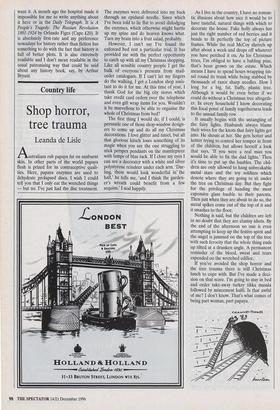Low life
Miserable Christmas
Jeffrey Bernard
Iwonder what Christmas cards tell you about the sender. Nearly all my friends in racing predictably enough send cards print- ed by the Injured Jockeys Fund which are boring prints of usually a famous horse like Desert Orchid and also predictable since racing people can only think about racing. The legion of nurses I have got to know over the past three years or so usually send joke cards, cartoons of limbless people in various predicaments which neither have me in stitches nor sutures.
I hate joke cards of all sorts from silly birthday cards to those awful 'get well' cards. What on earth is wrong with the tra- ditional? Nothing. I prefer to see a squadron of angels flying round a baby like moths hovering around a flame to someone called Santa Claus who is too fat to get down the chimney pot. I am all for the old fashioned at Christmas and how the thou- sands of Marks and Spencer customers, and I am one of them, can prefer Black Forest Gateau to the old recipe Christmas pudding — mine is coming all the way from Yorkshire — is beyond me.
But if among all the stupid cards that are printed these days they had a card wishing the recipient a Miserable Christmas, I would send one to every resident in Kemp House, the block of flats I live in. They are even more despicable, mean, small-minded and prone to malicious gossip than the inhabitants of the average English village. Only the caretaker is benign. Last night, I was so ill and weak that I couldn't even get up from my sofa to make myself a cup of tea and some toast, and I had lain there all day with nothing after being dialysed by a nurse who had taken too much off me, four kilos in three hours, and my evening home- help didn't appear.
It later transpired that she had turned up and that my answer-phone to buzz her in had not been working. When eventually I did see her, I was almost in a faint and she told me that one of my neighbours, who had been coming through the front door and who could and should have let her in when she explained who she was, just slammed the door in her face. In any other block the incident could be regarded as a nasty and very rude one-off, but in this block that is par for the course.
Vera has told me over the months and for just over three years now that my neigh- bours are also inordinately interested in how much I drink and in the female visitors have. The news for them is very bad. I cut down on my drinking 18 months ago and stopped drinking altogether last June when my kidneys took a permanent holiday as I began mine in Marrakesh. As for female visitors, the only ones I get are mostly dis- trict nurses, my doctor, or a business con- tact from what was Fleet Street. Now that I am nearing the average age of the residents here, I shall try very hard to avoid becom- ing as malignant as they are, as they sit around inside the front door poisoning each other.
And now I am preparing to get pushed out for the one and only sortie to the shops to buy the odd present and order some food that I will finally not be able to face and that will therefore become rotten and be thrown down the rubbish chute. It will be horrendous in a wheelchair being bumped into by crowds of shoppers, talked down to by shop assistants and have their enquiries all addressed to whoever is push- ing me. 'Would he like a blue or a red jer- sey?' That is the sort of question I have to listen to before screaming and shouting obscenities at my breaking point which is never far away these days. As for presents, the easy get-out which I am bored rigid by is CDs. I am even fed up with buying them for myself although I am tempted by a review I read recently of a new disc of the Rachmaninov Piano Concerto No. 3 per- formed by Cherkasky which was described as being extremely lyrical as opposed to Argerich's exhibition of pyrotechnics and technical skill.
Also, and by the by, my book of the year would make a good present and I can't think of a single bloody person who would want it. A month ago the hospital made it impossible for me to write anything about it here or in the Daily Telegraph. It is A People's Tragedy: The Russian Revolution 1891-1924 by Orlando Figes (Cape f20). It is absolutely first-rate and my preference nowadays for history rather than fiction has something to do with the fact that history is full of better plots. It is also extremely readable and I don't mean readable in the usual patronising way that could be said about any history book, say, by Arthur Bryant.




















































































































 Previous page
Previous page